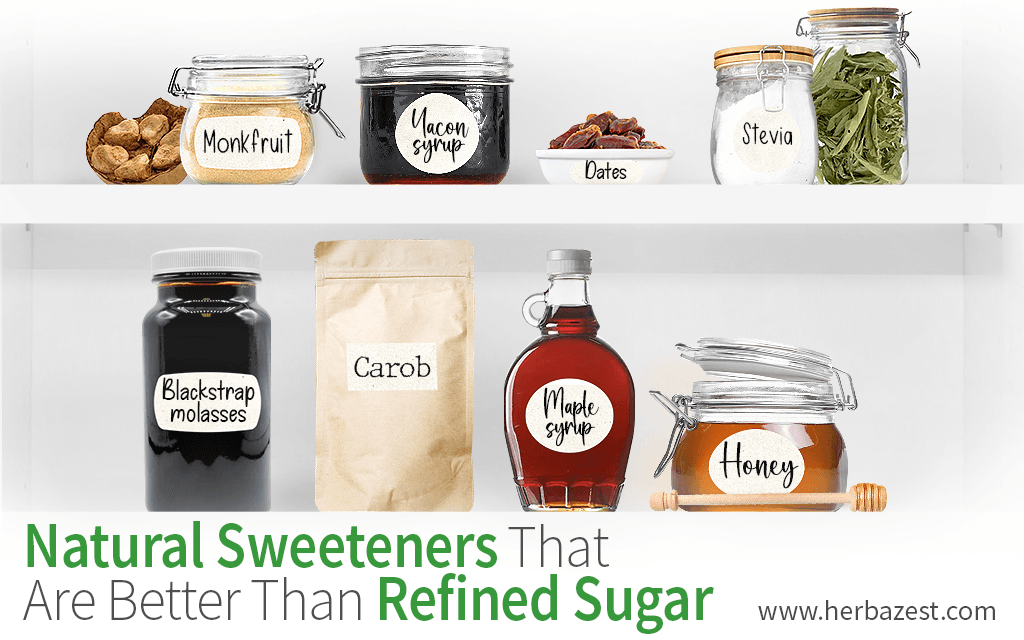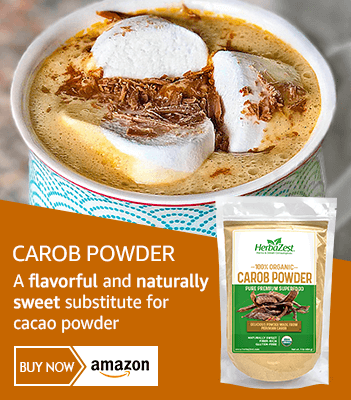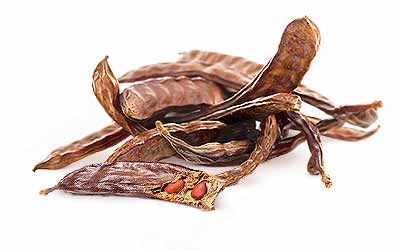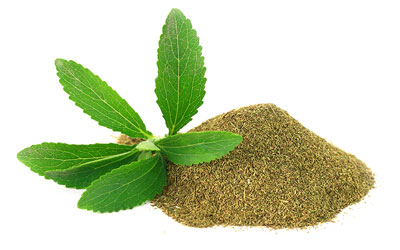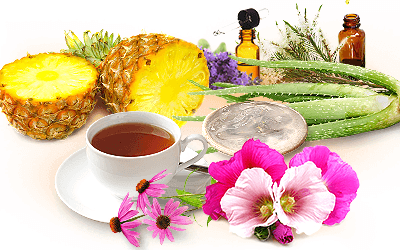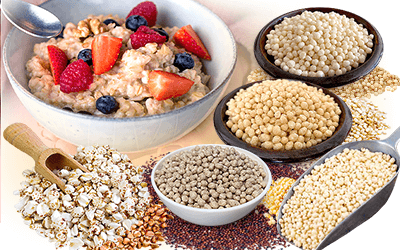After being consumed, white sugar enters the bloodstream and is metabolized quickly, causing sudden spikes of blood sugar. Due to the way it's processed, it's not only stripped of any nutrients sugar cane or sugar beets naturally have, but it also contains chemicals used to make it white and free of impurities.
The US Department of Agriculture estimates that the average American consumes 34 teaspoons of sugar a day, while the recommended daily limit is no more than 10 teaspoons.1
Fortunately, nature offers several worthy refined sugar substitutes, many of which are absorbed into the bloodstream more slowly and contain a handful of important nutrients. It's worth keeping in mind that although these sweeteners are natural, eating them in excess may still cause adverse health effects. Discover our eight natural sweeteners that are healthier than refined sugar!
1. Stevia
Stevia tops the list of best natural sugar substitutes. It is a few hundred times sweetener than sugar, yet contains no calories. Thanks to its unique characteristics, studies have shown that stevia can benefit diabetics since it doesn't raise blood glucose or insulin levels like sugar. Stevia is most commonly available as dry leaves or powder.
2. Monk fruit
Native to Southeast Asia, monk fruit is a popular sugar replacement these days. It contains zero calories, doesn't cause sudden blood sugar spikes, and has a texture that resembles granulated sugar. Preliminary research also suggests that mogrosides, compounds found in monk fruit, may have antioxidant and anti-inflammatory properties.
3. Honey
Honey is perhaps the world's most well-known natural sweetener, with uses dating back to over 8,000 years.2 Raw honey contains enzymes, vitamins, and minerals, to which it owes its antibacterial, antioxidant, and anti-inflammatory properties. Keep in mind that pasteurized honey no longer has most of its health benefits.
4. Maple Syrup
Another popular sugar alternative is maple syrup. Made from the sap of the maple tree, it is full of antioxidants and important minerals, like calcium, zinc, and potassium. Read the labels to ensure you're buying pure, preferably dark-colored maple syrup instead of maple flavored syrups, which are essentially flavored sugar syrups.
5. Carob
Carob is often considered a chocolate replacement. That's because in order to make chocolate sweet, the naturally bitter cacao is mixed with lots of sugar. Carob, on the other hand, has a similar chocolaty taste and natural mild sweetness, helping cut down on added sugar in many recipes. Plus, carob may be beneficial to diabetics thanks to its soluble fiber.
6. Yacon Syrup
Yacon is an Andean tuber that contains inulin and fructooligosaccharides, which are credited for its properties. They've been shown to have beneficial effects on blood sugar levels as well as promote the growth of the good microorganisms in the gut. The syrup has a caramel-like taste and a low glycemic index.
7. Dates
Dates are delicious and versatile sugar substitutes. They're packed with fiber and nutrients and also have a low glycemic index. As such, they may help regulate blood sugar levels and manage weight. There are a number of date products available on the market that can replace refined sugar, including dried dates, date syrup, and date sugar.
8. Molasses
Molasses cannot be omitted from the list of natural sugar replacements. A byproduct of sugarcane production, it's rich in vitamins and minerals, like iron, calcium, and vitamin B6. With a low glycemic index, it's a valuable sweetener for stabilizing blood sugar levels. Blackstrap molasses has a deeply sweet and slightly bitter flavor.
Additional Ideas
Another great example of natural sweeteners are fruits. They are some of the most versatile foods out there that are naturally sweet and packed with nutrients and other beneficial compounds. Pureed ripe bananas can sweeten anything from muffins to puddings. Apple sauce can add a little sweetness to pancakes and waffles. Freshly squeezed fruit juices can be a wonderful base for refreshing beverages and other recipes.
Experts agree that it's not necessary to exclude all sugar from one's diet. A better approach is to use sugar in moderation and choose healthier, less processed sweeteners that still contain valuable nutrients and offer some health benefits. While you're at it, you may also be inspired to replace white flour with more nutritious, gluten-free flours in your favorite recipes.
Sources
- Cleveland Clinic, The 5 Best (and Worst) Sweeteners You Can Eat | Is Monk Fruit a Healthy Sweetener?
- Diabetes, Metabolic Syndrome and Obesity, Mogroside IIIE Alleviates High Glucose-Induced Inflammation, Oxidative Stress and Apoptosis of Podocytes by the Activation of AMPK/SIRT1 Signaling Pathway, 2020
- Encyclopedia of Food Chemistry, Natural Sweeteners, 2019
- Food Research International, Yacon syrup reduces postprandial glycemic response to breakfast: A randomized, crossover, double-blind clinical trial, 2019
- Harvard T.H. Chan - School of Public Health, Added Sugar, 2022
- International Journal of Food Properties, Nutritional and functional profile of carob bean (Ceratonia siliqua): a comprehensive review, 2023
- University Hospitals, Are ‘Natural’ Sweeteners Healthier Than Sugar?, 2023
- American Heart Association, Added Sugar is not So Sweet – Infographic, n.d.
Footnotes:
- US Department of Agriculture. (2019). The Question of Sugar. Retrieved April 3, 2023, from https://www.ars.usda.gov/plains-area/gfnd/gfhnrc/docs/news-2012/the-question-of-sugar/
- Avicenna Journal of Phytomedicine. (2020). Effects of stevia on glycemic and lipid profile of type 2 diabetic patients: A randomized controlled trial. Retrieved April 3, 2023, from https://www.ncbi.nlm.nih.gov/pmc/articles/PMC7103435/


